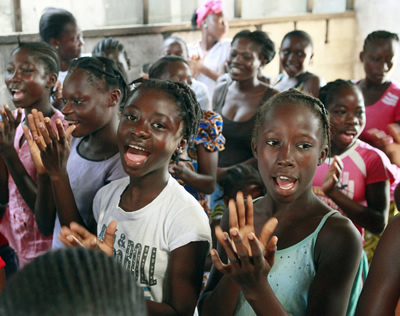 Across the world today, teenage girls are making their voices heard and promoting a transformational idea: empower adolescent girls everywhere. As part of the United Nations Foundation’s Girl Up campaign, girls and other supporters are holding more than 50 events in nine countries to celebrate the “International Day of the Girl Child,” a day to recognize the power of girls across the world and to advocate for their rights.
Across the world today, teenage girls are making their voices heard and promoting a transformational idea: empower adolescent girls everywhere. As part of the United Nations Foundation’s Girl Up campaign, girls and other supporters are holding more than 50 events in nine countries to celebrate the “International Day of the Girl Child,” a day to recognize the power of girls across the world and to advocate for their rights.
The truth today is that girls in many parts of the world aren’t seen as part of the equation. They have been overlooked by many on a global level and aren’t valued on a local level as equal members of their families or communities. They have the potential to be innovators, entrepreneurs, and leaders, but too many are denied the opportunity to thrive.
The statistics paint a shocking picture of the problem. Globally, more than half of out-of-school children are girls. In many countries, they shoulder a much heavier burden of the household chores than boys, which takes time away from studying. Adolescent girls are also vulnerable to sexual violence and HIV. And every year, an estimated 10 million girls under the age of 18 become child brides. As one report summarized it, “Girls and young women are generally less educated, less healthy, and less free than their male peers.”
While the oppression of girls perpetuates a cycle of poverty, the empowerment of girls has a ripple effect that strengthens families, communities, countries, and ultimately the world. If a girl stays in school, remains healthy, and gains skills, she will likely marry later, have fewer and healthier children, and earn an income that she’ll invest back into her family. This promotes more productive and stable countries — enhancing global prosperity and security and benefiting us all.
Most importantly, what happens to adolescent girls should matter because human rights matter. Girls deserve the same opportunities to pursue their hopes and dreams no matter where they live.
Despite the current situation, there is reason for optimism. Take the story of Jen, a girl the UN Foundation team met in Malawi. Her family couldn’t afford to send her to high school, so she stayed home with limited opportunities for the future. Her story is common in Malawi, where most girls don’t finish primary school and nearly half are married by age 18. But Jen’s life changed when she had the chance to join a program that taught her skills to earn an income. She learned to sew, cut, and drape cloth and used her training to start a business and take control of her life.
Jen’s story is an example of the challenges girls face, but also the potential they hold.
A growing movement of people, governments, and organizations, from teenage girls to U.S. Secretary of State Hillary Rodham Clinton to the United Nations and The Elders, are pressing for greater empowerment of girls. This movement has mobilized to push for additional investments, better health services, expanded educational and economic opportunities, and the promotion of girls’ rights.
While we have made some progress, we have more work to do. One of our most urgent challenges is ending the tragedy of child marriage. Today is an important moment for each of us to speak out against this practice and to encourage world leaders to support and invest in girls.
Together, let’s build a world where a child’s destiny is determined by drive and ability, not by gender. It’s the idea that girls are sharing with the world today. And it’s an idea we should all get behind.



 View All Blog Posts
View All Blog Posts